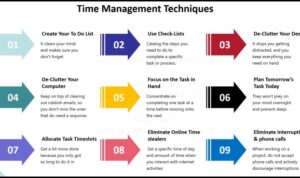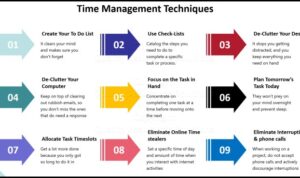Effective Time Management sets the stage for success, showing how balancing priorities can lead to a stress-free and productive lifestyle. Get ready to dive into the world of optimizing your time like a pro!
In the following paragraphs, we will explore various strategies, tools, and techniques to help you conquer your schedule and make the most out of your day.
Importance of Effective Time Management

Effective time management is crucial for both personal and professional success. It allows individuals to prioritize tasks, set achievable goals, and make the most out of each day. By managing time effectively, one can experience a wide range of benefits in their daily life.
Enhanced Productivity
Proper time management leads to increased productivity as individuals are able to focus on important tasks and complete them efficiently. By setting clear goals and deadlines, people can avoid procrastination and stay on track with their work, resulting in higher output and quality.
Reduced Stress
Effective time management helps in reducing stress levels by eliminating the need to rush through tasks or worry about missed deadlines. When individuals have a well-organized schedule and allocate time for each activity, they can approach their responsibilities calmly and confidently, leading to a more relaxed mindset.
Better Work-Life Balance
Proper time management is essential for maintaining a healthy work-life balance. By allocating time for work, family, hobbies, and self-care, individuals can avoid burnout and enjoy a fulfilling personal life alongside their professional commitments. This balance is crucial for overall well-being and happiness.
Strategies for Effective Time Management

Effective time management involves utilizing various strategies to prioritize tasks, set goals, and create schedules to optimize productivity.
Prioritizing Tasks
- Make a to-do list: Write down all tasks that need to be completed.
- Use the Eisenhower Matrix: Categorize tasks into urgent, important, not urgent, and not important to prioritize effectively.
- Consider deadlines and importance: Focus on tasks that are both urgent and important first.
Setting SMART Goals
- Specific: Clearly define what needs to be accomplished.
- Measurable: Set objectives that can be quantified to track progress.
- Achievable: Ensure goals are realistic and attainable.
- Relevant: Align goals with your overall objectives and priorities.
- Time-bound: Establish deadlines to create a sense of urgency.
Creating a Daily or Weekly Schedule
Having a structured schedule helps in utilizing time efficiently and staying organized.
“A schedule allows you to allocate specific time blocks for different tasks, ensuring that everything gets done without feeling overwhelmed.”
- Block out time for specific tasks: Allocate time slots for each activity based on priority and estimated duration.
- Include breaks: Factor in short breaks to rest and recharge, enhancing overall productivity.
- Review and adjust: Regularly review and adjust your schedule as needed to accommodate changing priorities.
Tools and Techniques for Time Management: Effective Time Management
Effective time management requires the use of various tools and techniques to help individuals prioritize tasks, stay organized, and maximize productivity. Let’s explore some popular tools and techniques that can assist in managing time more efficiently.
Popular Time Management Tools
- Calendars: Calendars are essential for scheduling appointments, deadlines, and important events. They provide a visual representation of time and help individuals plan their days effectively.
- Planners: Planners allow individuals to jot down tasks, set goals, and track progress. They are handy for creating daily to-do lists and staying on top of responsibilities.
- Apps: Time management apps like Trello, Todoist, and Google Calendar offer digital solutions for organizing tasks, setting reminders, and collaborating with others. These apps often come with features like notifications and time tracking to enhance productivity.
Time Management Techniques
- Pomodoro Technique: The Pomodoro Technique involves breaking work into intervals (typically 25 minutes) separated by short breaks. This method helps maintain focus and boost productivity by working in short, concentrated bursts.
- Eisenhower Matrix: The Eisenhower Matrix categorizes tasks into four quadrants based on urgency and importance. By prioritizing tasks according to these criteria, individuals can focus on what truly matters and eliminate time-wasting activities.
- Time Blocking: Time blocking involves allocating specific time slots for different tasks or activities throughout the day. By creating a structured schedule, individuals can better manage their time, reduce multitasking, and improve concentration.
Tips for Eliminating Time-Wasting Activities and Improving Focus, Effective Time Management
- Avoid multitasking: Focus on one task at a time to enhance productivity and reduce distractions.
- Set realistic goals: Break down tasks into manageable steps and set achievable deadlines to prevent overwhelm.
- Limit distractions: Identify and eliminate sources of distractions, such as social media or unnecessary meetings, to maintain focus.
- Regular breaks: Take short breaks between tasks to recharge and maintain mental clarity throughout the day.
Overcoming Time Management Challenges
When it comes to managing your time like a boss, you might face some serious challenges along the way. But fear not, we’ve got the solutions to help you stay on top of your game!
Procrastination and Distractions
Procrastination and distractions are like those sneaky little gremlins that try to steal your time away. The key to overcoming them is to identify your triggers. Is it social media? Netflix? Once you know what’s causing the distraction, you can create a plan to combat it. Try using the Pomodoro technique – work for 25 minutes straight, then take a 5-minute break. Repeat until you slay that to-do list!
Dealing with Unexpected Interruptions
Life is full of surprises, and unexpected interruptions can throw a wrench in your perfectly planned schedule. The trick here is to be flexible and learn to prioritize. When something unexpected pops up, assess its importance and urgency. If it can wait, reschedule it for later. If not, adjust your schedule accordingly and get back on track as soon as possible.
Adapting to Changes in Schedules
Flexibility is the name of the game when it comes to adapting to changes in schedules. Sometimes things don’t go according to plan, and that’s okay. Take a deep breath, reassess your priorities, and make the necessary adjustments. Remember, it’s all about staying focused and resilient in the face of change. You’ve got this!
Time Management in Different Environments
In various environments, such as work settings, personal life, or academic pursuits, the approach to time management may vary significantly. Let’s delve into how time management differs based on the setting and explore its importance in each scenario.
Work Setting vs. Personal Setting
In a work setting, time management often revolves around meeting deadlines, attending meetings, and completing tasks efficiently to enhance productivity. On the other hand, in a personal setting, time management can involve balancing household chores, personal hobbies, and social activities. While work settings have structured schedules and deadlines, personal settings require more flexibility and adaptability.
Importance of Time Management for Students
For students, effective time management is crucial to academic success. By managing their time wisely, students can prioritize tasks, allocate study hours efficiently, and avoid procrastination. Improving study habits, such as creating a study schedule, setting SMART goals, and eliminating distractions, can enhance time management skills and boost academic performance.
Tips for Managing Time Effectively in Remote Work or Flexible Schedules
When working remotely or dealing with flexible schedules, maintaining a routine and setting boundaries are essential for effective time management. Here are some tips to help navigate such environments:
- Establish a dedicated workspace to minimize distractions and enhance focus.
- Create a daily or weekly schedule outlining tasks and deadlines to stay organized.
- Set specific work hours to maintain a healthy work-life balance.
- Utilize time-tracking tools or apps to monitor productivity and identify time-wasting activities.
- Take regular breaks to recharge and prevent burnout.
By implementing these strategies, individuals can optimize their time management skills in diverse environments and achieve greater efficiency and productivity.










